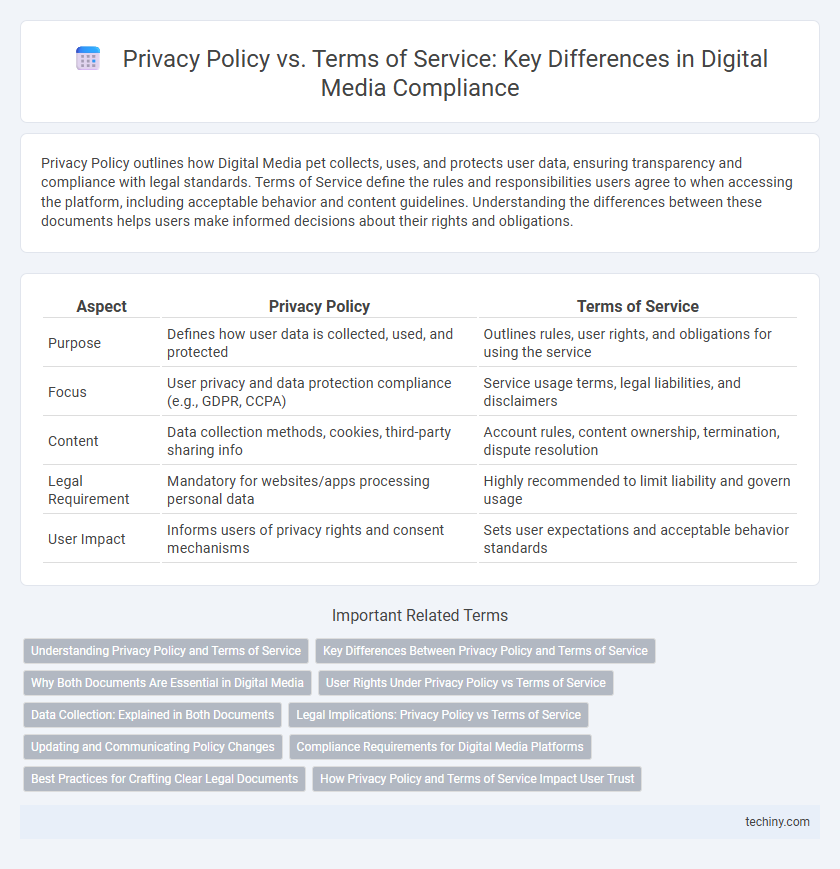Privacy Policy outlines how Digital Media pet collects, uses, and protects user data, ensuring transparency and compliance with legal standards. Terms of Service define the rules and responsibilities users agree to when accessing the platform, including acceptable behavior and content guidelines. Understanding the differences between these documents helps users make informed decisions about their rights and obligations.
Table of Comparison
| Aspect | Privacy Policy | Terms of Service |
|---|---|---|
| Purpose | Defines how user data is collected, used, and protected | Outlines rules, user rights, and obligations for using the service |
| Focus | User privacy and data protection compliance (e.g., GDPR, CCPA) | Service usage terms, legal liabilities, and disclaimers |
| Content | Data collection methods, cookies, third-party sharing info | Account rules, content ownership, termination, dispute resolution |
| Legal Requirement | Mandatory for websites/apps processing personal data | Highly recommended to limit liability and govern usage |
| User Impact | Informs users of privacy rights and consent mechanisms | Sets user expectations and acceptable behavior standards |
Understanding Privacy Policy and Terms of Service
Privacy Policy outlines how digital media platforms collect, use, and protect users' personal data, ensuring transparency and compliance with privacy regulations like GDPR and CCPA. Terms of Service define the rules and guidelines for using the platform, detailing user responsibilities, content ownership, and limitations of liability. Understanding both documents is essential for users to make informed decisions about their data privacy and rights while engaging with digital media services.
Key Differences Between Privacy Policy and Terms of Service
Privacy Policy explains how a digital media platform collects, uses, and protects users' personal data, ensuring compliance with regulations like GDPR and CCPA. Terms of Service define the rules, user responsibilities, and legal agreements governing the use of the platform, including content ownership and dispute resolutions. Understanding these distinctions helps users recognize their rights regarding data privacy versus the behavioral expectations within the service.
Why Both Documents Are Essential in Digital Media
Privacy Policy and Terms of Service are essential in digital media for ensuring transparency and building user trust by clearly defining how personal data is collected, used, and protected. The Privacy Policy specifically addresses user privacy rights and data handling practices, while the Terms of Service establish the rules and guidelines for platform usage, content ownership, and liability. Together, these documents provide legal protection for both users and service providers, fostering a secure and trustworthy digital environment.
User Rights Under Privacy Policy vs Terms of Service
User rights under a Privacy Policy primarily focus on how personal data is collected, used, stored, and shared, granting individuals control over their information through options like data access, correction, and deletion. Terms of Service govern the rules and conditions for using a digital media platform, outlining user responsibilities, acceptable behavior, and the provider's liability limitations. Understanding both documents ensures users are informed about their privacy protections and the usage boundaries within digital media environments.
Data Collection: Explained in Both Documents
Privacy Policy explicitly details the types of personal data collected, such as browsing behavior, location, and contact information, emphasizing user consent and data protection measures. Terms of Service outline the legal framework governing the use of collected data in service delivery and user interactions, including rights and responsibilities. Both documents collaborate to provide transparency about data collection practices and user control over personal information in digital media platforms.
Legal Implications: Privacy Policy vs Terms of Service
Privacy Policy outlines how digital media platforms collect, use, and protect user data, ensuring compliance with regulations like GDPR and CCPA. Terms of Service define user rights, responsibilities, and permissible actions on the platform, serving as a binding legal contract. Failure to adhere to either can result in legal penalties, user distrust, and potential litigation.
Updating and Communicating Policy Changes
Privacy Policy updates focus on detailing how user data is collected, used, and protected, requiring clear communication to maintain transparency and compliance with regulations like GDPR and CCPA. Terms of Service updates typically address changes in user rights, responsibilities, and platform rules, necessitating explicit user consent to ensure enforceability. Effective communication channels such as email notifications, in-app alerts, and website banners are essential to inform users promptly about these changes and uphold trust.
Compliance Requirements for Digital Media Platforms
Digital media platforms must ensure their Privacy Policy clearly details data collection, usage, and user rights to comply with regulations like GDPR and CCPA. Terms of Service should define user responsibilities, content guidelines, and liability limitations supporting legal adherence and user protection. Maintaining updated compliance documentation reduces risk of penalties and builds trust with users in the evolving digital landscape.
Best Practices for Crafting Clear Legal Documents
Effective privacy policies and terms of service must use precise language to clearly define user rights, data collection practices, and liability limitations. Incorporating plain language and organized sections enhances readability and user comprehension, which reduces legal risks and improves trust. Regular updates aligned with regulatory changes and transparent disclosures ensure compliance and foster user confidence in digital platforms.
How Privacy Policy and Terms of Service Impact User Trust
Privacy Policy and Terms of Service play critical roles in establishing user trust by clearly outlining how personal data is collected, used, and protected in digital media platforms. Transparent Privacy Policies reassure users about data security and compliance with regulations like GDPR and CCPA, while comprehensive Terms of Service define user rights and obligations, minimizing ambiguity and legal risks. Together, these documents enhance user confidence and foster long-term engagement by promoting accountability and ethical data practices.
Privacy Policy vs Terms of Service Infographic

 techiny.com
techiny.com